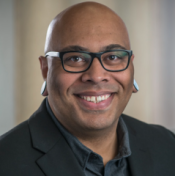Professor explores African Americans’ role in social work

Photo courtesy iStock/Getty Images
Before professional social workers began serving the underserved, African Americans relied on a sustained tradition of self-help and mutual aid.
They had to, said Justin Harty, an assistant professor in the Arizona State University School of Social Work who researches Black people’s roles in the field as both providers and recipients.
“For a long time, the profession didn’t initially serve Black communities, for a number of reasons,” Harty said.
Americans have been doing social work since at least the late 19th century as populations mass migrated to cities. Arrivals often found their new communities lacked adequate resources to serve them — which led to “poverty, disease, increased child labor, prostitution and mental illness, and more,” according to a history of the profession on the Social Work Blog of the National Association of Social Workers. Charities and other nonprofits sent the first social workers to help.
The first social workers used a model that European settlers brought across the Atlantic Ocean and adapted it to primarily help Americans of European descent, Harty said.
‘Social settlements’
Places called “social settlements” — such as Chicago’s Hull-House — emerged. Jane Addams, recognized as the founder of social work in the U.S., opened Hull-House in 1889 to help urban, poor European immigrants improve their lives.
Hull-House and others like it in the Chicago area did not serve Black clientele, contrary to some contemporary perceptions, said Harty, who studied at the University of Illinois Chicago’s Jane Addams College of Social Work. The college is a short distance from Hull-House, which is now a museum.
Black communities frequently resisted social workers’ efforts that they felt were oppressive and not meeting their needs, he said.
Harty said once he joined the ASU faculty in 2022, he began his research to learn more about how Black people factored into the practice and profession of social work.
“We talk about contributions of Black people because they have been historically left out of the narrative,” he said.
Harty said his research indicates Black communities developed parallel social work movements to those such as Addams’, opening charities and houses that served Black people, inspired by the rich African traditions of mutual support.
He said it’s important to better integrate records of African Americans helping each other into historical accounts because for a long time, Black people encountered resistance to including such information.
‘Radical social work’
Some facts about Black social work efforts might surprise people today, Harty said. For example, the Black Panthers, a left-wing political organization of the 1960s and 1970s, performed social work, offering services such as free breakfasts and medical care, he said.
“These were pivotal moments in Black history,” he said. “There’s a conundrum, though: Do we consider these acts to be social work, or do we consider them to be Black history?”
Harty used the term “radical social work” to describe advocacy against the status quo.
“It’s important to recognize what the community was doing for itself, which is different from what social work is as a profession,” he said. “Where was Black social work, as a verb, being done? With that, we hear of a larger national movement. What we don’t hear about is the local social work at a community level.”
Harty’s research started as a side project, he said, but the well-publicized deaths of George Floyd and Breonna Taylor in 2020 encouraged him to widely share information he had gathered and to expand his study.
“It has been an honor to be supported by a faculty that wants me to do this historical research,” he said.
ASU’s School of Social Work recently adopted a new mission statement that states in part, “Our school is dedicated to the principles of equity, inclusion, anti-colonialism, anti-oppression and anti-racism.”
Learning from history to improve today
Historically, social work took what Harty termed a one-size-fits-all approach to address the effects of colonialism and racism.
Harty said that the Council on Social Work Education created multicultural task forces in the 1970s to deal with racism within the profession. The council recommended that social workers address racism and colonialism together, not separately.
“That was 50 years ago, and social work continues to struggle in addressing each of those issues. Had we heeded their warnings 50 years ago, we’d be in a better position to address these concerns,” he said.
Harty said Black social work history research surged during the 1980s and 1990s, but waned in the decade that followed. It is now experiencing a comeback in the wake of recent opposition to diversity, equity and inclusion (DEI) initiatives and other threats to democracy and academic freedom, he said.
Social work students and junior faculty today seek to recognize the profession has “a very troubled past that we need to confront if we are to move forward,” Harty said.
“Leaving that to the powers that be encourages efforts to erase it. I want to make sure Black social work history doesn’t undergo this erasure,” he said. “To me, that’s social work, the verb, bringing this up as coming to the forefront.”
Harty said the main takeaway from his research so far has been uncovering contributions to social work from people who resisted inequality, even though it existed within many American institutions.
“In our history, it’s important to recognize when things are not covered and taught and recognizing omissions in our history," he said. "Over all, we have a lot to learn about the history of resistance to inequality and oppression, and we have to use that history to address inequality now.”
Harty said he hopes his research will contribute to a more inclusive historical record of social work.
“Guided by the African tradition of Sankofa, I hope to use the legacy of Black social workers as a basis for developing contemporary strategies to tackle existing inequalities,” he said.
Sankofa, according to Adinkra Symbols & Meanings, is “an expression in the Twi language of Ghana whose literal meaning is, ‘Go back and get it!'” A corresponding Akan proverb states that “it is not taboo to go back and get something after you have forgotten it." More literally, it means if you forget and you do go back to get it, there is nothing wrong with it.
Harty said that as he researches, he hopes Black History Month and other commemorations of the lives and influence of African Americans keep growing, until people are talking about the importance of Black contributions every month, not merely once a year.
More Local, national and global affairs

Arizona public universities work together to predict housing insecurity before homelessness strikes
The words “housing insecurity” conjure up the image of a family living in a car after losing their home, frantically seeking an affordable new place to live.What if there was a way to predict housing…
A record 9 ASU students awarded US Department of State’s Critical Language Scholarship
Nine Arizona State University students have been selected for the highly competitive Critical Language Scholarship, or CLS, program — an initiative of the U.S. Department of State that aims to…

Putting hope above hate at antisemitism conference
Hatred and hope were the overarching themes of the “Rising Above Together” conference hosted April 11 by the Anti-Defamation League in partnership with Arizona State University.Hatred: According to…


